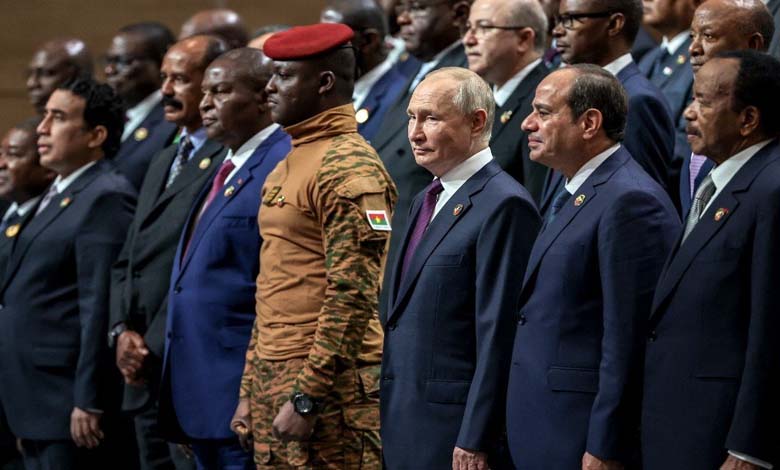Broad Russian Diplomatic Engagement in Africa Paves the Way for Greater Influence

Plans to open new Russian embassies in Niger, Sierra Leone, and South Sudan align with a policy focusing on several key areas, including supporting liberation movements, combating terrorism, and ensuring food security.
Moscow is seeking to expand its economic and geopolitical influence in Africa as global competition for the continent’s markets and resources intensifies. The Russian Ministry of Foreign Affairs announced plans to open new embassies in Niger, Sierra Leone, and South Sudan.
-
Russia Activates “Soft Power” in Africa
-
Observatory: Russia Transferred Syrian Officers to a Base in North Africa
The African continent holds a significant position in Russia’s strategy, aiming to extend its reach through economic and military partnerships, humanitarian aid, and political support in international forums. The embassy openings are part of this strategic approach.
According to Anatoly Bashkin, Director of the Africa Department at the Ministry of Foreign Affairs, quoted by Izvestia, the Russian embassies in Niamey (Niger) and Freetown (Sierra Leone) will resume operations after being closed in 1992 due to financial challenges.
-
With the “African Initiative,” Russia Strengthens Its Influence in Burkina Faso
-
The race for Africa… The rivalry between the US and Russia intensifies in the Central African Republic
In South Sudan, which gained independence in 2011, the establishment of a Russian embassy will mark Moscow’s first diplomatic presence in the young nation.
Moscow’s strategy focuses on several main areas, including supporting liberation movements, combating terrorism, and ensuring food security. Historically, Russia has provided military, political, and logistical support to several African nations in their fight against colonialism, such as Algeria, Angola, and Mozambique.
Russian Ambassador to Mali and Niger Igor Gromyko confirmed that Moscow is currently working to resume the activities of its embassy in Niger.
-
Russia Maintains Positive Neutrality on Western Sahara Issue to Boost African Interests
-
“He insulted all Africans”: Macron’s Comments Spark Repercussions in Burkina Faso
Russia aims to capitalize on African discontent with Western influence by cooperating with regimes opposed to it. Moscow is seen as a partner by several African countries striving to break free from neo-colonialism and excessive reliance on Western powers.
In counterterrorism efforts, Russia provides military training, weapons, and security advice to several African nations, such as Mali and the Central African Republic, to confront groups like Boko Haram, ISIS, and Al-Qaeda. It emphasizes direct military solutions, steering clear of the conditions often tied to Western aid.
Regarding food security, Russia, one of the world’s largest wheat exporters, meets a significant portion of Africa’s food needs. Direct agreements with African nations ensure food supplies at affordable prices, especially for countries affected by economic crises and droughts.
-
Political Events Awaiting Africa in 2025
-
“The Ultimate Flood”: How the Houthis Turned African Migrants into Fuel for War
A Russian report revealed President Vladimir Putin’s intention to visit several African countries, including Niger, in 2025. The tour reflects growing Western concerns over the transfer of military equipment from Syrian bases to eastern Libya.
According to the Russian site Fondsk.ru, preparations are underway for a potential visit by Putin to Africa in 2025, specifically to South Africa, the Central African Republic, and Niger.
South Africa, a key member of BRICS, is a strategic partner for Moscow, and Putin’s visit would carry significant symbolic importance, showcasing disregard for the so-called International Criminal Court’s rulings.
-
Russia Accuses the U.S. and the U.K. of Recruiting Agents to Target Its Bases in Syria
-
Morocco: The Most Qualified to Represent Africa at the Security Council
Visits to Niger and the Central African Republic are also expected to highlight the rapid decline of French influence in the region and its partial replacement by Russia.
Russia’s strategy toward African nations reflects Moscow’s ambitions to reshape the global order in its favor, leveraging the continent’s natural resources, particularly fossil fuels, and securing allies across the region to counter the Western-dominated system.
For African countries to benefit from this global competition, they must pursue foreign policies that prioritize their populations’ interests. This requires resolving internal and regional conflicts to prevent foreign interventions that exploit crises to maintain influence.
-
Rising Terrorist Activities in the African Sahel… “Global Report”
-
Russia Accuses Ukraine of Arming Hayat Tahrir al-Sham
-
Houthis Accused of Recruiting Mercenaries to Fight with Russia












